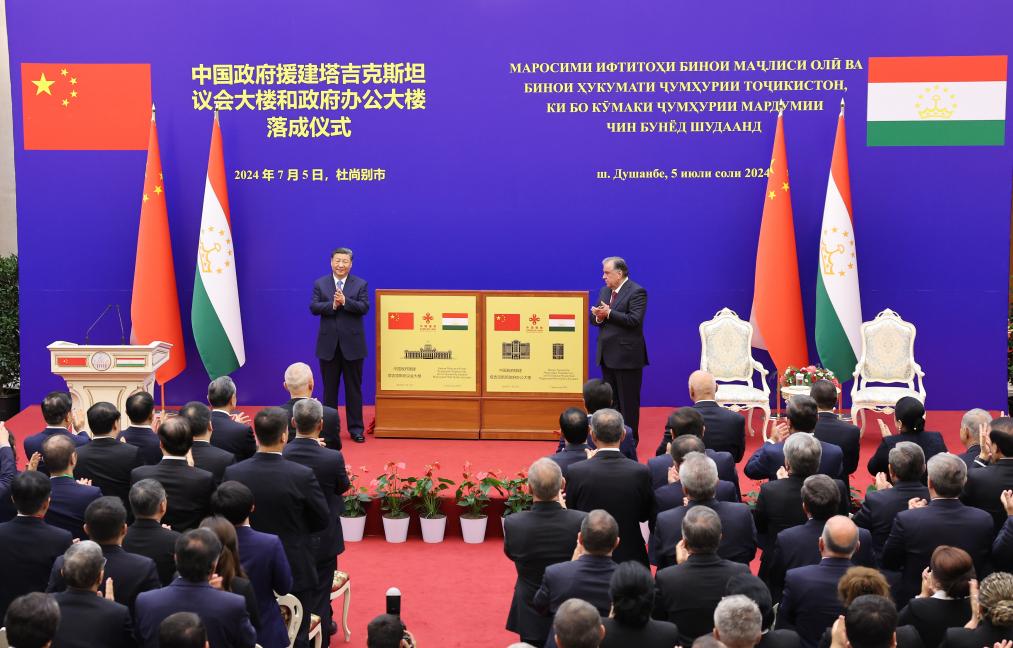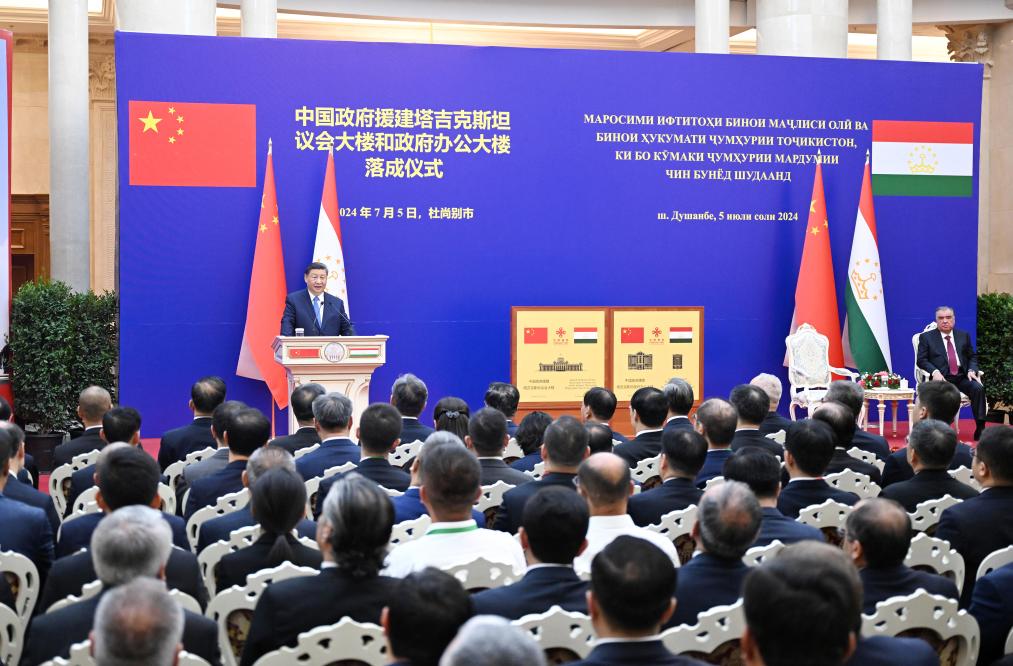
Chinese President Xi Jinping and Tajik President Emomali Rahmon attend the inauguration of a parliament building and a government building aided by China in Dushanbe, Tajikistan, July 5, 2024. (Xinhua/Yao Dawei)
DUSHANBE, July 5 (Xinhua) -- In Dushanbe, the capital of Tajikistan, two newly constructed building compounds on Rudaki Avenue stand less than a kilometer apart. These architectural marvels shine brilliantly under the sunlight.
On Friday, visiting Chinese President Xi Jinping and Tajik President Emomali Rahmon attended the inauguration of the parliament and government buildings aided by China in Dushanbe.
Xi noted that the two buildings have become new landmarks symbolizing the friendly cooperation between China and Tajikistan.
China is ready to work with Tajikistan to continue to uphold the principle of extensive consultation, joint contribution and shared benefits, carry out more cooperation projects in Tajikistan and make greater contribution to the economic and social development of Tajikistan, Xi said.
Rahmon noted the buildings are the most precious gift given to the Tajik people by President Xi on the occasion of the 10th anniversary of his first state visit to Tajikistan, and another testimony to the profound friendship between the two countries. They will surely be recorded in the annals of Tajikistan-China relations and be celebrated by the Tajik people for generations to come, he said.
In August 2020, construction commenced on the Tajikistan parliament and government building projects, which were undertaken by China. These two iconic structures represent the collaborative efforts between the two countries along the Belt and Road, marking the first time that China has adopted a mode featuring collaborative design in its foreign aid projects.
"This building integrates local cultural elements, adopting a classical European colonnade structure combined with Persian and Islamic decorative styles. The color schemes and decorations of different meeting rooms and halls also vary," said Zhang Zhigang, General Manager of Yan Jian Group's Tajikistan branch, as he guided the reporters through the building and introduced its features.
The Tajikistan parliament building is a captivating sight to behold. With two 250-seat meeting halls for the Upper and Lower House, a spacious two-tier joint conference hall that can accommodate 1,500 people, and over a hundred diverse offices, exploring the building feels like navigating an exotic maze.
The interior of the building is adorned with exquisite marble walls, magnificent wooden decorative columns, and sparkling crystal chandeliers. These stunning elements create a dazzling visual spectacle.
In an office within the parliament building, Mustafo Rasulov meticulously inspects every inch of the room. As the overseer of the building's quality, he admires the exceptional craftsmanship displayed by the Chinese workers.
"Chinese colleagues always prioritize quality and pay meticulous attention to every detail. I have great confidence in the buildings they construct," he said. Rasulov firmly believes that this building, with its historical significance, will stand as a timeless architectural masterpiece.
Just a short distance away from the parliament building is the Tajikistan government building. "The magnificent 13-story building seamlessly integrates with the surrounding landscape, blending architecture with the beauty of nature ..." said Sha Wenhai, the General Manager of Jiangsu Jiangdu Construction Group's overseas company, eagerly pointing out the exquisite exterior features of this remarkable structure.
Similar to the parliament building, the government building is a collaborative design effort between China and Tajikistan, seamlessly blending the design norms and technical standards of both countries. The building successfully preserves the traditional decorative style of the Tajik people while also showcasing the exceptional craftsmanship of Chinese architecture. This fusion of cultural elements from both countries creates a harmonious and visually captivating architectural masterpiece.
"This building exemplifies the perfect balance between aesthetics and functionality," said Sha, pointing to an air outlet in the government building.
"To highlight the Tajik national style in the wall carvings, we adopted a curved design and recessed the decorative stone wall by 20 centimeters at the air outlet. The angle of the air supply can be adjusted as needed, and the external decorations are removable for easy maintenance," said Sha.
Shahin Negmatov, a construction worker with 30 years of experience, considered the Tajikistan government building project to be the pinnacle of his career. "I admire the exquisite craftsmanship of my Chinese colleagues. It's a great honor to build my homeland together with them," he said.
Chinese constructors have worked on other landmark buildings in Dushanbe. One notable structure is the Tajikistan Independence and Freedom Tower, standing tall at 121 meters in the center of a city park. Constructed by a Chinese company, it has become a renowned landmark. Visitors flock to the observation deck to capture breathtaking panoramic views of the city and its surroundings.
Another remarkable building is the Tajikistan National Library, located on one side of the Friendship Square in the city center. Also constructed by a Chinese company, it resembles an open book, symbolizing the invitation to immerse oneself in the vast sea of knowledge. This library holds such significance that it is even featured on the country's 200 somoni banknote, serving as a lasting commemoration for generations to come.
Yusuf Akhmatbekzoda, deputy director of the Government Project Management Bureau of the Presidential Office of Tajikistan, said these "Made by China" buildings are unique, enhancing Dushanbe's architectural landscape and improving the city's appearance. "They will stand as symbols of Tajik-Chinese friendship, benefiting our descendants," he said. ■

Chinese President Xi Jinping speaks during the inauguration of a parliament building and a government building aided by China in Dushanbe, Tajikistan, July 5, 2024. Xi and Tajik President Emomali Rahmon on Friday attended the inauguration in Dushanbe. (Xinhua/Yan Yan)



